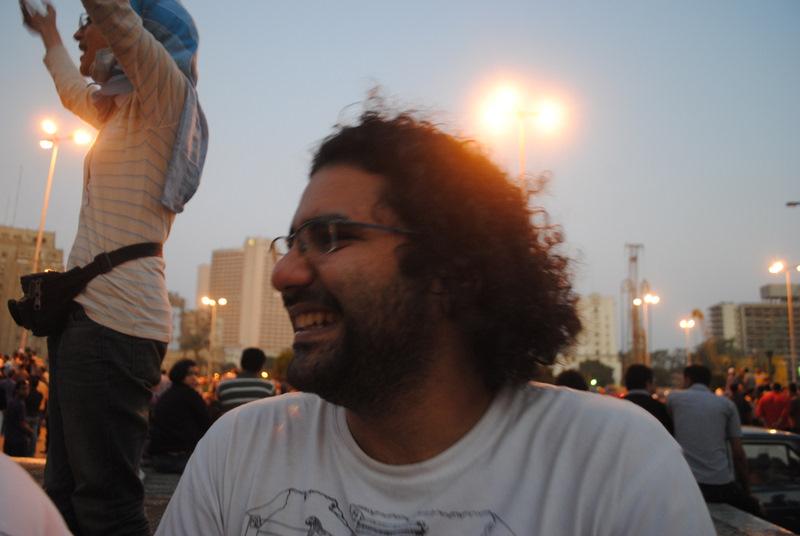Thousands Tried Under Military Rule in Post Revolution Egypt
Alaa Abd El Fattah in Tahrir Square in June. On Sunday, Oct. 30 Fattah was jailed by a military court for 15 days. Hes accused of inciting violence. (Photo: Wiki Commons)
The detention of a prominent blogger and activist by Egypt’s military prosecutor has set the stage for the latest clash between democracy activists and the generals that rule the country.
Even as Egypt prepares for parliamentary elections at the end of this month, observers say the army insists on remaining above the law, and silencing its critics.
The army has tried over 12,000 civilians in military courts since they took control of the country last February.
A few nights ago, protesters gathered in a traffic circle in downtown Cairo. Then they headed, loudly and angrily, to the military prison where blogger and activist Alaa Abdel Fattah is currently being detained.
Abdel Fattah and fellow activist Bahaa Saber were called in for questioning on October 30 and refused to acknowledge the authority of the military prosecutor. Abdel Fattah was taken into custody.
“Down with military rule,” chanted the protesters. “Take one of us, you’ll get a hundred!”
The generals who rule the country maintain that military courts are necessary to preserve law and order — because they’re fair and quick. And because the country is currently under military jurisdiction the courts are perfectly legal.
Activists and human rights groups say the trials are arbitrary, unfair and a form of political intimidation.
“All the lawyers we’ve spoken to have said, ‘it’s a sham,'” said Shahira Abouellail, one of a group of young activists who have been working on the No to Military Trials campaign. “It’s not really a trial. You’re tried by the military. Most of the time you’re tried collectively so there’s like 30 people there and they all get prosecuted together and they all get the same sentence within like five minutes to half an hour,” she said.
For months now, the No to Military Trials group has been inviting the family members of young men detained and convicted by the military to speak out.
The mother of a young man arrested in Tahrir Square asked: “What kind of a revolution is this, where the kids who made the revolution are arrested and the thieves that robbed the country and humiliated us, are still free?”
Activists like Abouellail contend that the point of military trials is not to maintain law and order but to create a climate of fear, they say. Many ordinary Egyptians with no political affiliation – who just happen to be at the wrong place at the wrong time – also go through military courts, says Human Rights Watch researcher Heba Morayef.
“From a human right’s perspective every single one of those should be retried in civilian courts,” Morayef said. “And that’s an extremely hard battle to fight when you’re up against a military that has absolute executive and legislative power in the country.”
Egypt’s Army Council
When it took power, the ruling Army Council promised it would hand power to a civilian government in six months. It now looks like they could remain in charge till the summer of 2013, when presidential elections would finally take place.
Not only does Emergency Law remain in place – the generals have added new provisions to it.
Blogger and activist Alaa Abdel Fattah has become the latest symbol of what Morayef calls “a message” being sent to all young activists.
Alaa Abdel Fattah is very significant,” Morayef said. “It’s not only that he is one of the most vocal and high-profile critics of the military. It’s also that he is one of the most active. He’s at every protest. I think the military makes very targeted choices. They believe in sending signals. You can see from their public statements and their decision in terms of who they prosecute and the laws they pass that they see information as a threat.”
In fact, one military spokesman said that criticizing military trials is itself a crime. In recent months, the authorities have shut down television channels and programs and summoned journalists for questioning.
“The local media is being held hostage,” Shahira Abouellail said. “They’re not allowed to criticize the army. They’re not allowed to speak of any truths that are happening on the ground.”
Déjà vu
Abdel Fattah has been detained before: in 2006, by the Mubarak regime. The fact that he’s in jail again is part of a general sense of déjà vu in Egypt these days. The country will hold what should be its first free parliamentary elections at the end of this month, but it feels like none of the fundamentals have changed.
“Egypt is not better off in terms of human rights protections from where it was a year a go,” Heba Morayef said. “We still have the main executive power in the country, which is the military, which sets itself above criticism and above the rule of law.”
In fact, military leaders are pressuring political parties to pledge that in any new government there will be no civilian oversight of the army.
At a meeting on Tuesday, the government asked parties to sign onto a series of “constitutional principles” that stipulate, among other things, that the army’s budget will be secret and that its approval would be necessary to declare war.
Most of the parties walked out of the meeting, threatening protests and “a second revolution.”
That may be the only real change so far since Egypt’s revolution: a belief that people-power can make a difference.
“Freedom!” chanted the protesters the other night, as they marched to the military prison.
They still have a long way to go.
We want to hear your feedback so we can keep improving our website, theworld.org. Please fill out this quick survey and let us know your thoughts (your answers will be anonymous). Thanks for your time!
